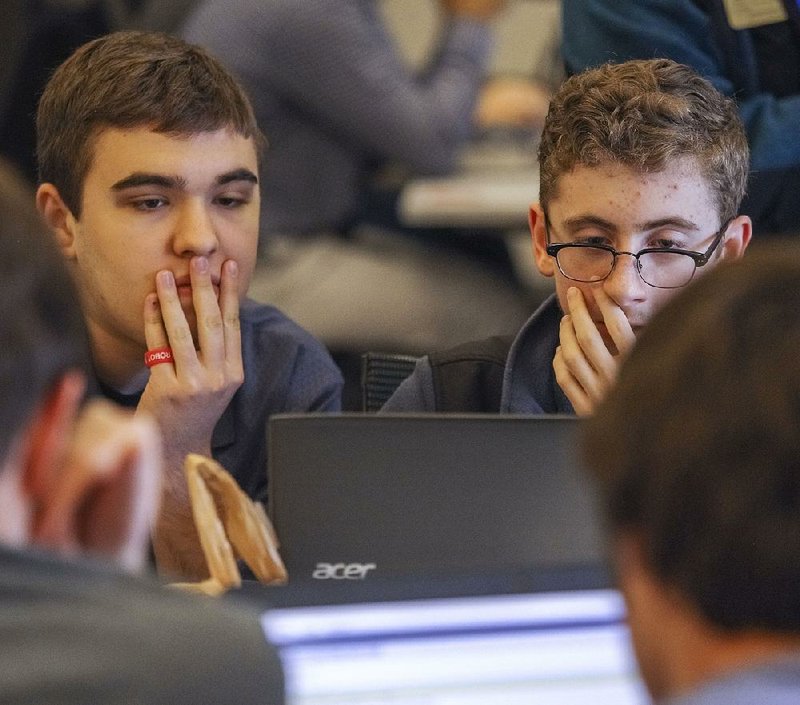The first statewide coding competition ended with first- and second-place finishes for Arkansas School for Mathematics, Sciences and the Arts teams and with a governor excited about growing student interest in his coding initiative.
Gov. Asa Hutchinson said during his 2014 election campaign that he would make computer coding a state priority. After entering office, he pushed for legislation to provide funding for teacher training, to mandate that high schools offer the courses and to allow the classes to count as math credits.
Last year, he announced an All-State Coding Competition to drum up student interest in programming. The competition was funded by a $40,000 check from Verizon. Hutchinson said Thursday that Verizon has committed to spending $50,000 on the competition next year.
"It's an incredible team-building experience for them," Hutchinson told reporters after he presented awards and queried seniors about how to improve the program. "It's competition, it's learning and it's a reward. That's how you build the initiative."
Carson Cato, Brandon Cox and Jackson Gregory from the Arkansas School for Mathematics, Sciences and the Arts placed first. They earned a $2,000 scholarship each and $20,000 for their school, located in Hot Springs.
All students at the math and science school take at least one computer science class. Cox has taken seven, Gregory has taken six and Cato -- who has a stronger interest in math -- has taken three.
Gregory -- who came from Lakeside High School -- said the number of students participating in coding competitions is growing.
"I noticed that there was a team from my old school at the regional qualifier. When I was there, they had maybe one computer class and they invested very little resources into it," he said. "So, from what I've been hearing, it has increased dramatically there."
Nicholas Seward, a computer science instructor and the team's sponsor, said computer science classes have long been a draw to the math and science school, but he's seen other districts start to catch up. A Fayetteville coding competition had roughly doubled in size from the year before, he said.
"Everything's growing like crazy," Seward said.
Gregory said the state competition involved solving five challenges in a three-hour time limit. The students were judged on both whether they solved the problem and the efficiency of their code in doing so.
They had to share a single computer, so Gregory and Cox concentrated on writing the code while Cato worked to develop the mathematical solutions to problems.
The second-place winners were Martin Boerwinkle, Brock Davis and Joe Sartini from the math school. They each received a $1,000 scholarship. Coming in third were Mason Brown, Gregory Maddra and Noah Wehn from Springdale Har-Ber High School. They each received a $500 scholarship.
The competition was held at the EAST Initiative in west Little Rock. EAST, or Environmental and Spatial Technology, is a computer-oriented educational nonprofit that works with schools in Arkansas and four other states.
Anthony Owen, computer-science coordinator for the Arkansas Department of Education, said more than 5,700 students are currently taking a computer science class. That's up from about 4,000 in the 2015-16 school year and 1,100 in 2014-15.
The goal is to have 6,000-6,500 students in coding classes at any given time. Owen figures that'll mean about 20 percent of Arkansas students will learn coding before graduating.
He said his biggest challenge remains training enough teachers to serve the interested students. The state will spend about $10 million on the program over four years, with most of the money going toward training teachers.
National organizations like Code.org consider Arkansas a leader in computer science education because of the law requiring schools to offer students coding courses and the state funding dedicated to helping schools follow through.
Owen said tech companies like Facebook -- which said it would donate $1 million worth of virtual reality gear to Arkansas schools in January -- are also recognizing the state's program.
Hutchinson said Thursday that he would embark on his fourth tour of Arkansas high schools next month to continue drumming up support for the program.
"To make this successful and for Arkansas to continue to lead, we need to have students who are encouraging other students to take coding and you're doing that," he said.
Metro on 05/05/2017
